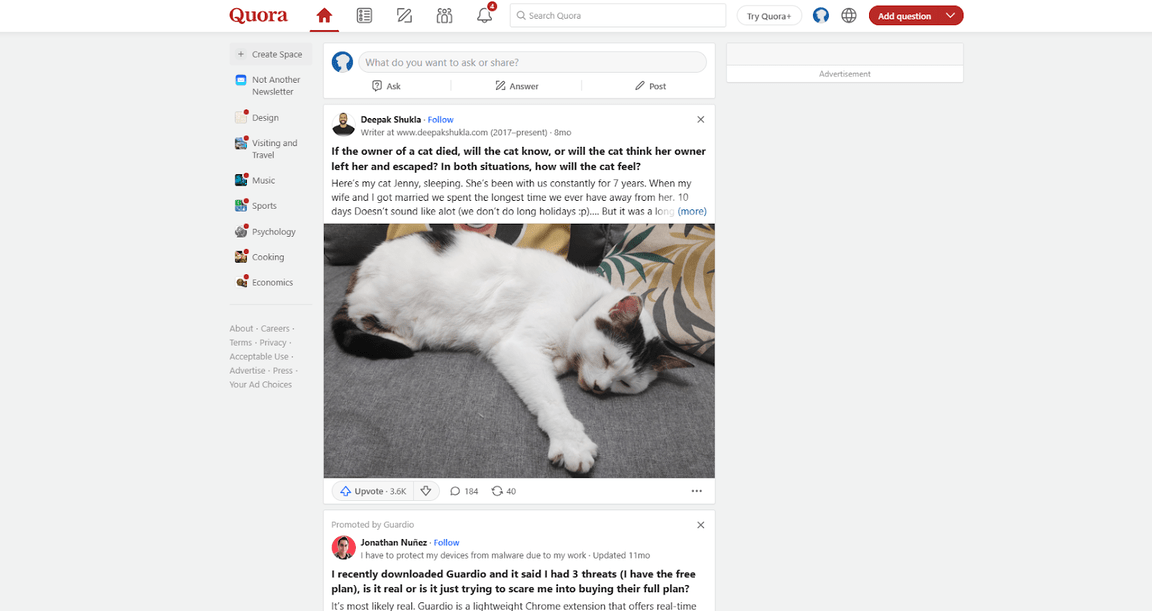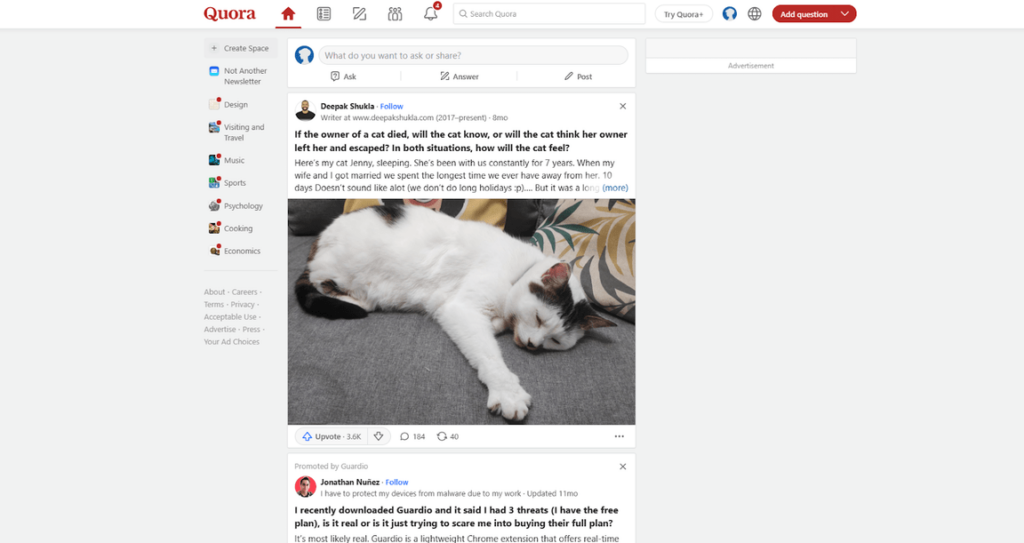Is Quora Safe?
Laura Martisiute
Reading time: 6 minutes

Table of Contents
If you use or plan to use Quora, you need to know: Is Quora safe?
Below, we explain whether Quora is:
- Safe to use.
- Good for privacy.
We also give some steps you can take to improve both your safety and privacy when using this online service.
What Is Quora?
Quora is a popular question-and-answer platform where users can ask questions, provide answers, and engage in discussions on a wide variety of topics.

Founded in 2009 by former Facebook employees Adam D’Angelo and Charlie Cheever, Quora has grown into a global community where users can gain insights from experts and enthusiasts alike.
Quora users can ask questions on any topic, from simple factual inquiries to complex discussions. Other users provide answers. Answers can be upvoted or downvoted by other users, helping to highlight the most helpful and accurate responses.
Each Quora user has a profile where they can share information about themselves, their areas of expertise, and their interests. Profiles also display the user’s activity, including questions asked and answers provided. Users can join groups called Spaces that focus on specific interests or topics.
While Quora has many benefits, such as knowledge sharing and community engagement, it also has drawbacks, including a lack of consistent quality with responses and moderation challenges.
Is Quora Safe?
Quora can be a safe platform for knowledge-sharing and discussion, but like any online community, it’s important to exercise caution and common sense when making posts or responding to questions.
Quora has some safety features in place, including a moderation system to manage content quality and enforce community guidelines. Users can also adjust their privacy settings to control who can see their profile.
The platform also says it maintains “appropriate technical, administrative, and physical safeguards” to protect user information. It doesn’t go into detail what these safeguards are, but that’s not unusual.
In 2018, Quora suffered a major data breach, leaking data about 100 million users, including their passwords. Quora only reported the breach to users after several days, which some see as indicative of their lack of concern regarding user data and safety.
Is Quora Private?
Depends on your definition of “private.”
Quora relies on users posting and responding to questions. For Quora users, that means that their privacy is in their hands to some degree – and caution should be used when creating or responding to any posts to prevent overly personal details from being included.
Quora allows users to hide their profiles from other users, stop their profiles from showing up on Google, and block other users entirely, which can improve privacy and safety.
Quora’s privacy policy is comprehensive and easy to read.
The platform collects quite a lot of information about users. The policy states that Quora collects data about users whenever an account is created, when communications are made on the platform, and whenever payments are made.
The type of data collected and stored includes your name, email, topics you find interesting, your profile photo, education history, questions and answers, and third-party login details.
Quora keeps this information for as long as it has a relationship with you. Once this relationship ends, it will retain your information for “a period of time” for reasons like legal compliance with record retention requirements.
Although Quora says it doesn’t currently use users’ posts, answers, or comments to train large language models (LLMs), it also says that this could change in the future. For this reason, Quora lets users opt out of having AI models be trained on their content. You can read more about this and how to opt-out here.
Terms of Service; Didn’t Read (ToS;DR), a project that rates internet services’ terms of service and privacy policies, gives Quora a “Grade D.” For comparison, Reddit, which is similar to Quora, gets a “Grade E.”
The biggest concerns listed by ToS;DR include Quora storing data on users who don’t interact with the platform, tracking users via third-party cookies for purposes including advertising, and potentially keeping personal data even after users request to remove it for business interests or legal obligations.
Additionally, according to ToS;DR, Quora can track users’ activity on other websites and license content to third parties.
On the plus side, Quora doesn’t sell your personal information, allows you to opt out of targeted advertising, and warns you of the potential consequences related to third-party access. The platform also notifies users when material changes to the privacy policy are made.
The Common Sense Privacy Program, which rates internet services based on their safety and privacy for kids, gives Quora a Quick Rating of “Warning.” Quick Ratings can either be “Pass,” “Warning,” or “Fail.”
How to Improve Your Safety and Privacy on Quora
Follow the below steps for a safer and more private experience on Quora.
- Adjust privacy settings. Go to your Quora settings and navigate to the “Privacy” section. Here, you can customize who can see your content, send you messages, and follow you. You can choose between “Everyone,” “Registered Users,” or “Only Me” for different aspects of your profile.
- Limit visibility of your profile. You can choose to make your profile less visible by limiting who can view it. Set your profile visibility to “Only Me” if you want to keep it entirely private or restrict it to only registered users.
- Control who can follow you. In the privacy settings, you can specify who can follow you on Quora. You can choose to allow only registered users to follow you or limit it further to only people you follow back.
- Moderate comments and messages. Quora allows you to moderate comments and messages you receive. You can choose to receive messages only from people you follow or restrict messages altogether.
- Manage content visibility. When posting questions, answers, or comments, you can control who can see them. You can set the visibility to “Public,” “Anonymous,” or choose specific groups of people who can view your content.
- Be selective with personal information. Avoid sharing sensitive personal information on your profile or in your posts. Be cautious about revealing details such as your full name, location, or contact information.
- Review your followers. Regularly review your list of followers and remove any that you’re not comfortable with. Quora allows you to block users if necessary.
- Report violations. If you encounter any privacy violations or harassment on Quora, report them to Quora’s support team. The platform takes privacy and safety concerns seriously and will take appropriate action.
Our privacy advisors:
- Continuously find and remove your sensitive data online
- Stop companies from selling your data – all year long
- Have removed 35M+ records
of personal data from the web
Save 10% on any individual and
family privacy plan
with code: BLOG10
news?
Don’t have the time?
DeleteMe is our premium privacy service that removes you from more than 750 data brokers like Whitepages, Spokeo, BeenVerified, plus many more.
Save 10% on DeleteMe when you use the code BLOG10.
















